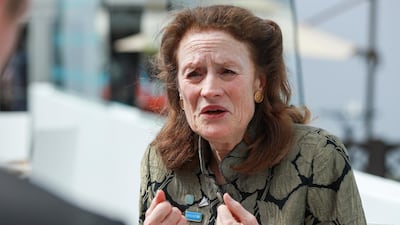The head of Unicef has warned that ongoing conflict in the Middle East risks creating a “lost generation”.
Henrietta Fore urged the world to “stand up” for young people in war-torn parts of the region.
Speaking to The National at the World Government Summit in Dubai, she said there was an urgent need for better education programmes in Syria to teach children how to spot unexploded weapons.
Young people in the country, around half of whom have never lived through anything other than war, were being attracted to the “prettily-coloured” devices and losing limbs when they touched them, she said.
The 70-year-old, who between 2007 and 2009 was in charge of administering almost $40 billion of American overseas aid per year and took over as Unicef executive director in January last year, visited both Yemen and Syria in 2018.
“Sometimes you think you’ve seen everything,” she said, reflecting on the personal impact the trips had on her. “But you see a child in front of you... We had one visit in to a hospital in which there was a mother who was racing in and she had a very ill child because of poor water and not enough food.
“And they’re so thin and so frail and you could just see with tears coming down her face that she was so worried that her child would die. You cannot but want to gather this child, bring food, do something to help. The child died in her arms and it just breaks your heart.
“When we were in the hospital we went into the incubator ward, these are the babies that have been born prematurely or need help just after they have been born. The lights went out, they lost all electricity. It meant that all the oxygen went out. And here are all these babies that are just struggling for breath. I mean, as a world it is inhumane if we don’t look at this.”
The incidents took place in Yemen.
Peace negotiations to end the conflict through the Stockholm Agreement have achieved some success, but there is still “too much violence,” she said.
There have been repeated breaches of the ceasefire by Houthi rebel factions since the deal was forged in December.
Earlier this week, Dr Anwar Gargash, the UAE's Minister of State for Foreign Affairs, said on social media that it was vital that "the international community support the agreement".
He added that the rebel group is "threatening the overall prospects for peace" through its persistent disregard for the deal.
“To everyone we say, we need peace,” Ms Fore added. "It’s what children need. Children are always the most fragile and are often the first victims in a war and in violence. We as a world have often forgotten that we need to look after children. They are our future. We who are older, and adults, need to help.”
At the summit, Unicef is promoting a new $3.9 billion humanitarian appeal, with the cash to be spent across 49 countries. Ms Fore took part in a panel discussion in which she spoke about Unicef’s "Generation Unlimited" campaign, which aims to ensure every child has access to a quality education by 2030.
Ms Fore also addressed the sexual exploitation and abuse scandal that engulfed the charity sector last year - Oxfam was hit with a major controversy after it was accused of covering up claims that its aid workers had sexually exploited female victims of the 2010 earthquake in Haiti.
Unicef also came under scrutiny, after James Forsyth, a deputy director at the charity, resigned over claims of inappropriate behaviour towards women in a previous job.
Unicef has also admitted failings in its efforts to keep children safe in the Central African Republic in 2013 and 2014.
An independent review in 2015 found that UN agencies’ response to allegations of sexual abuse by peacekeeping troops in the country was “seriously flawed” and “the welfare of the victims and the accountability of the perpetrators appeared to be an afterthought, if considered at all”.
Ms Fore issued a statement last year about sexual exploitation, abuse and harassment.
In it, she admitted to “failures in cultures and processes” at Unicef, adding that “this problem has lingered for too long”.
Among the new measures put in place are improved processes for staff to report any concerns, more strenuous vetting and commissioning external groups to scrutinise the organisation.
“We believe strongly in zero tolerance of any sort of sexual exploitation, abuse, or harassment,” she said. “The trends [of reports of concerns] are going up. People are now feeling the trust that they can speak up and something will be done about it.
“Whenever we have an allegation that comes into us, within 24 hours I know something is happening. We also have anonymous mechanisms so that we can tell when an office has something to look into. We have many mechanisms at work so people can speak up confidentially, in public, in their offices, so we can do something about it.”

